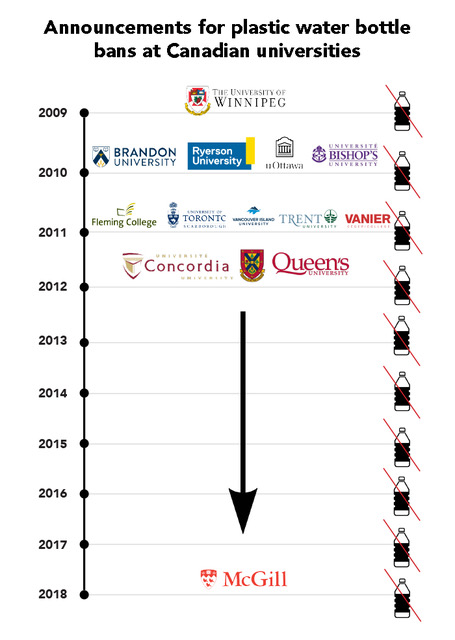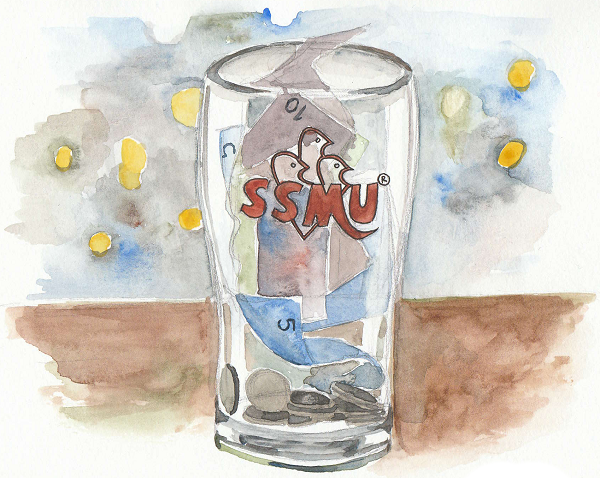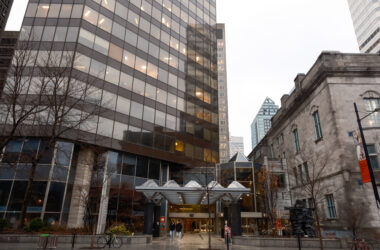McGill students have advocated for banning single-use water bottles on campus since 2010 and, on March 22, the university finally met their demands. McGill announced that it will begin phasing out the sale of single-use plastic water bottles from all food locations and vending machines on campus, with the goal of completely removing them by May 2019.
The university will also install additional water fountains across campus. This initiative was the result of consultations between the Students’ Society of McGill University (SSMU), the Post Graduate Students’ Society (PGSS), the MacDonald Campus Students’ Society (MCSS), and student stakeholders in November 2017.
Shortly after the ban was announced, the SSMU Sustainability commissioners passed a new Sustainability Policy on March 29 to outline how it will help student clubs and organizations obtain alternative sources of drinking water for their events. According to Caroline Lou, SSMU Sustainability commissioner, this policy mandates it to distribute information on plastic bottles to students, promote the use of tap water, and provide services related to waste reduction.
“We can’t visit every club’s events and meetings to monitor their internal practices, but we’re hoping to eliminate plastic water bottle use through education and awareness,” Lou said.
According to Francois Miller, sustainability director at the McGill Office of Sustainability (MOOS), roughly 85,000 plastic water bottles are sold on campus each year—not including bottles distributed by student clubs or associations. He predicts that the ban will help fulfill McGill’s Vision 2020 Climate and Sustainability Action Plan by lowering the university’s carbon footprint significantly, as each bottle is manufactured and transported using fossil fuels. Moreover, plastic water bottles take at least 450 years to degrade.
Dr. Joe Schwarcz, director of McGill’s Office for Science and Society, believes that the university has taken an environmentally responsible step as he explained the process of manufacturing bottled water.
“[The ban] is absolutely not for good publicity,” Schwarcz said. “The university does not benefit from it, society does. Transporting water is an expensive business because [water] is heavy. We also need to take into account the manufacturing of the bottle, which is an energy-intensive industry. Also, depending on where the water is taken from, you are disrupting the aquifers. There have been cases where you see that surfacers have collapsed due to water being sucked out from underneath.”

McGill is far from the first Canadian school to ban the sale of single-use water bottles on its campus. The University of Winnipeg was the first to ban plastic bottles from its campus in 2009. The University of Toronto followed in its footsteps in 2011, as did Concordia University in 2012.
While Miller acknowledges that McGill’s ban is late in comparison, he noted that there have been smaller initiatives to reduce the use of plastic bottles at specific locations on campus, such as SSMU’s ban on water bottle sales in the University Centre in 2009.
Although there are many environmental benefits to banning single-use water bottles, studies have shown that there are risks to this policy move. At the University of Vermont, for example, banning water bottles in 2013 led to an increase in sales of sodas and sweetened beverages.
Yet Miller is confident that McGill has taken the steps necessary to ensure that this doesn’t happen. He cited schools like Washington University in St. Louis, where banning single-use plastic water bottles instead lead to lower soda sales.
“[The potential increase in soft-drink sales] was a concern we kept in mind throughout our planning phase,” Miller said. “For this reason, we are supporting the ban by installing or upgrading over 25 new fountains on campus, as well as [selling] cheaper refillable bottles available throughout campus.”
A previous version of this article incorrectly stated that Caroline Lou is the SSMU Environment Committee chair; in fact, she is the SSMU Sustainability commissioner. In addition, the previous version stated that the SSMU Environment Committee passed a new Sustainability Policy when in fact the Sustainability commissioners passed the policy. The Tribune regrets these errors.









